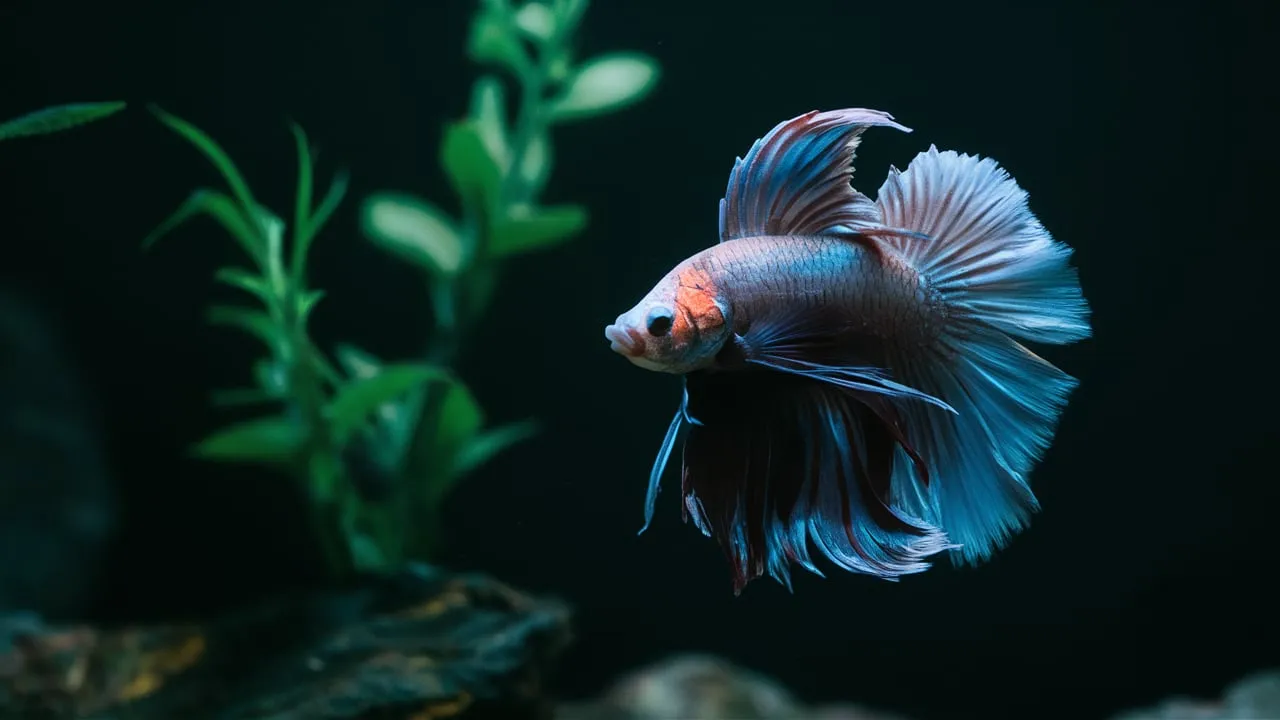Betta fish, often referred to as Siamese fighting fish, are one of the most popular aquarium fish species. These captivating creatures have unique behavioral patterns that fascinate both novice and experienced aquarium enthusiasts. One common question that arises is whether Betta fish are nocturnal? In this article of Betta Fish Tips, we will that deserves a closer look.
Understanding Betta Fish Behavior
Betta fish, scientifically known as Betta splendens, are native to the shallow, slow-moving waters of Southeast Asia. In their natural habitat, these fish have adapted to thrive in environments with limited light and resources. This adaptation has influenced their daily activity patterns and sleep cycles.

Are Betta Fish Nocturnal?
Contrary to popular belief, Betta fish are not fully nocturnal. Instead, they exhibit a crepuscular activity pattern, which means they are most active during the dawn and dusk periods. This is a common behavior observed in many aquatic species that inhabit environments with limited light, as it helps them maximize their foraging and predatory opportunities.
During the day, Betta fish typically spend more time resting and hiding, conserving their energy. As the sun sets and the lighting conditions change, they become more active, engaging in behaviors such as exploring their surroundings, hunting for food, and even displaying their vibrant colors and fins to potential mates or rivals.
Factors Affecting Betta Fish Activity Levels
While Betta fish exhibit a crepuscular activity pattern, it’s essential to note that various factors can influence their daily routine and the extent of their nocturnal behavior. These factors include:
- Lighting Conditions: The intensity and duration of lighting in the aquarium can significantly impact a Betta’s activity levels. Betta fish tend to be more active in environments with natural or simulated dawn and dusk lighting cycles.
- Tank Mates: The presence of other fish species in the aquarium can affect a Betta’s behavior. Betta fish are territorial and may become more active at night to avoid potential conflicts with tankmates.
- Feeding Habits: The timing and frequency of feeding can also influence a Betta’s activity patterns. Betta fish may become more active during the times when they expect to be fed.
- Individual Differences: Like humans, Betta fish can exhibit individual variations in their sleep patterns and activity levels. Some Betta fish may be more active during the day, while others may be more nocturnal.
Caring for Nocturnal Betta Fish
To ensure the well-being of a nocturnal Betta fish, it’s essential to provide an environment that caters to their natural behavior. This includes:
- Appropriate Lighting: Invest in aquarium lighting that simulates a natural dawn-to-dusk cycle, allowing for periods of reduced lighting or darkness.
- Hiding Spots: Provide ample hiding spots, such as live plants, decorations, or caves, where the Betta can retreat during the day and feel secure.
- Feeding Routine: Adjust the feeding schedule to coincide with the Betta’s natural activity patterns, ensuring they receive adequate nutrition.
- Tank Mates: Carefully select tank mates that are compatible with the Betta’s temperament and activity levels, minimizing potential conflicts and stress.
By understanding the unique behavior of Betta fish and adapting the aquarium environment accordingly, you can create a thriving and harmonious home for your nocturnal Betta companion.
What Are The Signs Of A Healthy Betta Fish?
Here are some signs of a healthy Betta fish:
- Bright, vibrant colors: A healthy Betta fish should have clear, bright colors with no fading or dullness.
- Erect fins: The fins, including the dorsal, anal, and caudal fins, should be upright and not clamped down.
- Active swimming: A healthy Betta fish should swim around its tank actively, exploring and showing curiosity.
- Smooth body and scales: The Betta’s scales should appear smooth and uniform, with no visible bumps or raised scales.
- Appetite: A healthy Betta will have a good appetite and eagerly accept its food.
- Clear eyes: The eyes should be clear and free of cloudiness or discoloration.
- No signs of disease: Healthy Bettas should have no visible signs of disease, such as white spots, reddish patches, or unusual growths.
- Appropriate behavior: A healthy Betta will display natural behaviors, such as flaring its fins, bubble nest building, and interacting with its environment.
If you notice any of these signs are not present, it may indicate an underlying health issue that requires attention and treatment.
Conclusion
In conclusion, the key signs of a healthy Betta fish include bright, vibrant colors; erect, undamaged fins; active, curious swimming; a smooth, uniform body; a good appetite; clear eyes; and an absence of any visible signs of disease or abnormal behavior. By observing these characteristics, you can assess the overall health and wellbeing of your Betta fish.

Bài viết liên quan
Introduction To Betta Fish Species
Betta fish, also known as Siamese fighting fish, are a popular choice among aquarium enthusiasts [...]
Jul
Understanding Types Of Neocaridina Shrimp
Neocaridina shrimp are a captivating group of freshwater crustaceans that have become increasingly popular among [...]
Jul
Understanding Fancy Goldfish Types
Goldfish, with their vibrant colors and graceful movements, have captivated the hearts of aquarium enthusiasts [...]
Jul